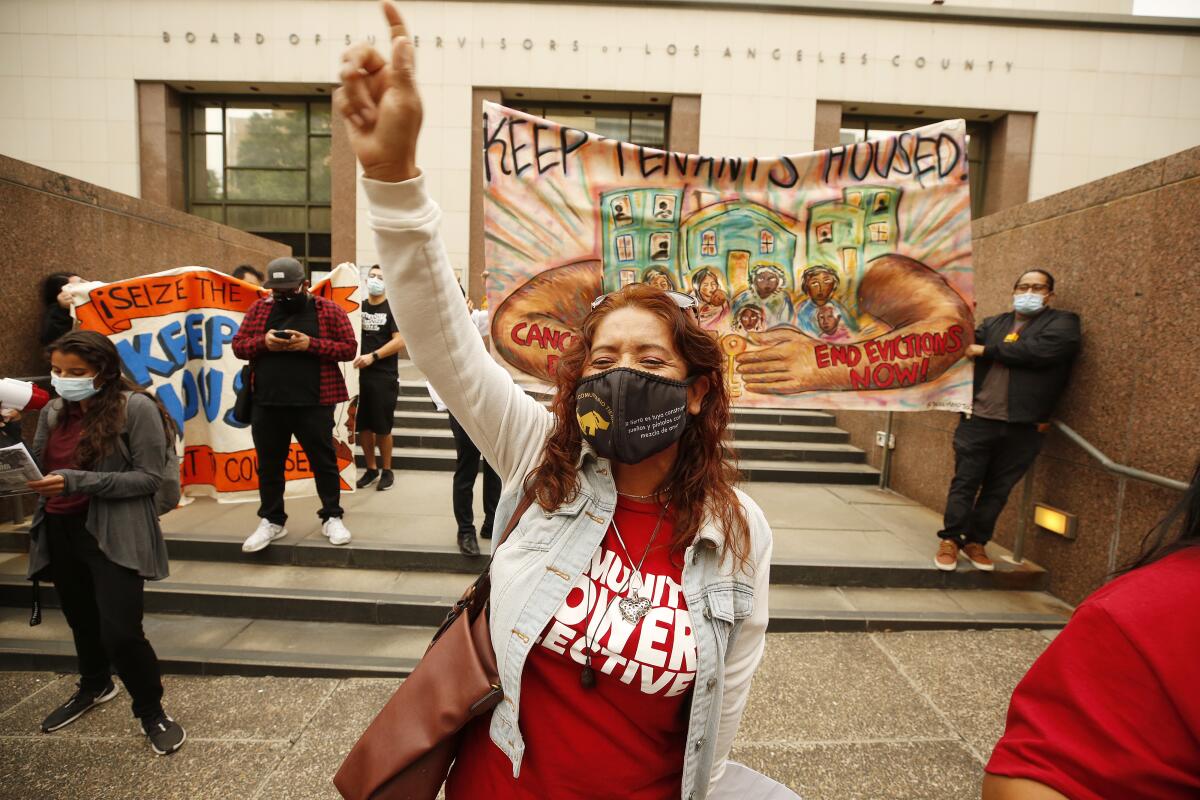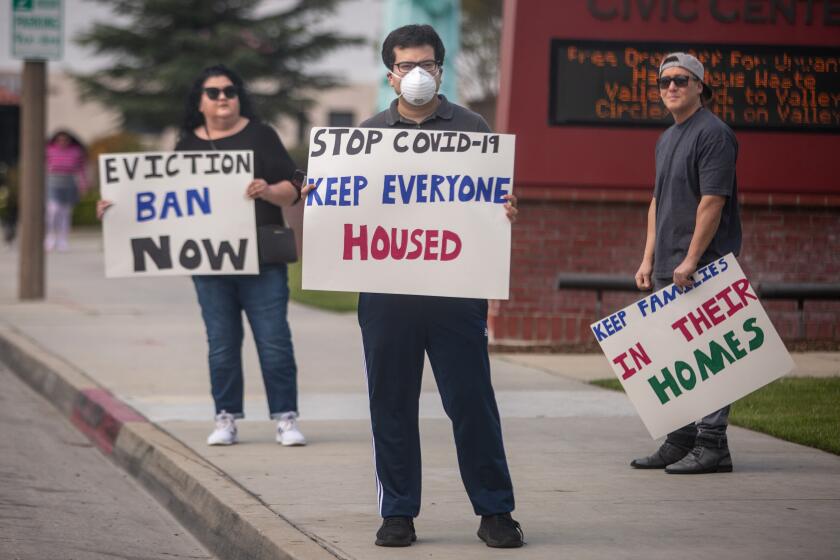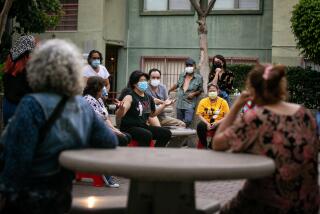Can I be evicted? L.A. County tenant protections explained

- Share via
California’s COVID-19 eviction moratorium expired Thursday, but there are still some protections in place for tenants whose finances were affected by the pandemic.
Depending on where you live, you may enjoy stronger protections than elsewhere in the state. For example, the city of Los Angeles still has a moratorium that forbids landlords from evicting tenants who have not paid rent because of the pandemic.
Here are some pointers for how to navigate the complex landscape of COVID-19 eviction rules.
What protections remain in place?
California residents may still be able to protect themselves against eviction if they file an application for rental assistance.
In Los Angeles County, commercial tenants still have eviction protections under a motion passed earlier this week.
The city of Los Angeles’ eviction moratorium for residential and commercial tenants could last for at least another year.
Once the moratorium ends, tenants could be evicted if they don’t pay the following month’s rent. But they will have a year to pay back the rent they owe.
Pasadena and Beverly Hills are among the other cities in L.A. County where residential tenants are still protected against eviction for not paying their rent because of COVID.
Does this mean I can’t be evicted if I live in L.A. and can’t pay my rent?
You should not be evicted for not paying your rent if COVID-19 was the cause of your financial hardship.
But you can still be evicted for other reasons, such as if you engage in criminal activity on the property or cause substantial damage to it.
In L.A. County during the pandemic, tenants are protected from some standard causes for eviction, such as unauthorized pets or an unauthorized long-term guest whose presence is related to the pandemic, or for causing a nuisance or denying entry to a landlord.
Angelenos who lost income in the pandemic can apply again for help paying the rent debt they’ve accrued. Landlords can apply too.
However, under some circumstances, landlords of single-family homes can still force you to leave if they or a family member need to move in — unless you are older than 62, have a disability, are terminally ill or are low-income.
Even though you can’t be evicted for nonpayment, your landlord can still sue you for the rent or could try to garnish your wages.
What protections are in place if I live in a part of L.A. County without an eviction moratorium?
As soon as you’re unable to pay your rent, housing advocates advise taking these actions:
Apply for state rental assistance immediately at housingiskey.com.
Notify your landlord in writing that you’re unable to pay.
Keep a record of all correspondence with your landlord.
If you receive an eviction notice from your landlord, you must respond, housing advocates say.
Your rental assistance application should trigger a state protection against eviction for nonpayment of rent. But that doesn’t mean a judge will automatically dismiss the case if your landlord brings eviction proceedings.
Judges unfamiliar with pandemic-related laws may “rubber stamp” cases in favor of landlords, said Faizah Malik, a staff attorney with Public Counsel.
“We are concerned tenants are going to fall through the cracks, especially tenants that don’t have counsel and don’t understand all these complicated rights they have,” Malik said.
What protections are in place for commercial tenants?
Under state law, L.A. County could not extend its eviction moratorium for residential tenants but could do so for commercial tenants. Those protections last through the end of January.
What is the deadline to apply for rental assistance?
There is no hard deadline. COVID-19 rent relief is still available from the state on a first-come, first-served basis and covers 100% of rent and utilities.
There are still plenty of funds available. As of mid-September, the state had paid or approved $1 billion of the $5.2 billion in federal and state money available.
“We urge you to apply for rent relief if you’ve missed any rent or utility payments since March 2020,” said Rafael Carbajal, director of the county Department of Consumer and Business Affairs, which oversees the county’s assistance efforts. “The same applies if you haven’t missed any payments but feel you will be unable to pay your rent or utilities going forward.”
Who qualifies for state rental assistance?
Most L.A. County tenants affected by COVID-19 are eligible for rental assistance if their household income is below 80% of the county’s median income. That translates to less than $66,250 for an individual or $94,600 for a family of four in L.A. County.
The cities of Long Beach and Santa Clarita have their own programs.
Tenants and landlords who lack legal immigration status can apply if they’ve been financially affected by COVID. They can also ask local or state agencies for help without fear of being turned over to immigration authorities.
Tenants who live in illegal dwellings can also apply.
Where can I find more information?
Stay Housed L.A. is hosting tenant workshops worships and legal clinics over the next week. Their number is (888) 694-0040.
The L.A. County Department of Consumer and Business Affairs can help determine whether you qualify for help and what rights you might have as a tenant or landlord, including whether you qualify for free legal assistance.
Times staff writer Andrew Khouri contributed to this report.
More to Read
Sign up for Essential California
The most important California stories and recommendations in your inbox every morning.
You may occasionally receive promotional content from the Los Angeles Times.












